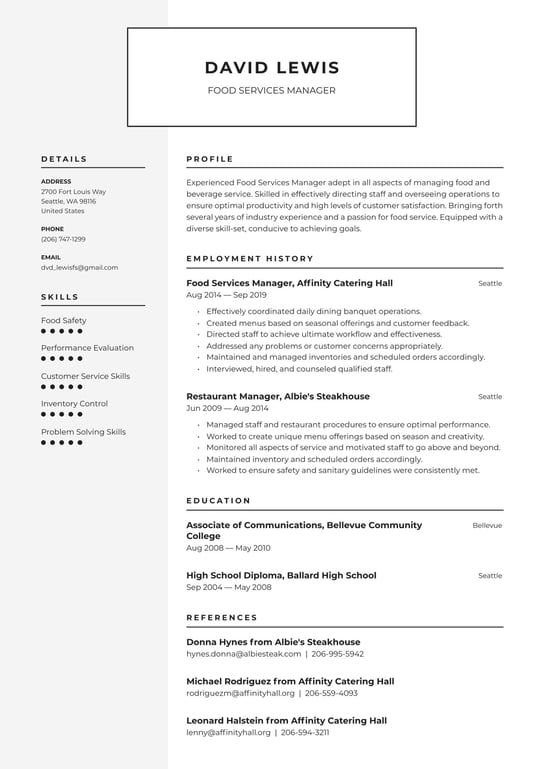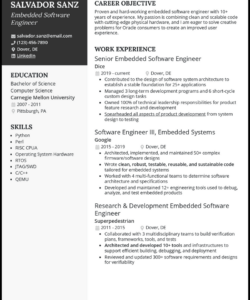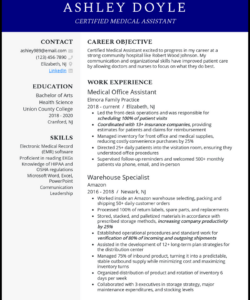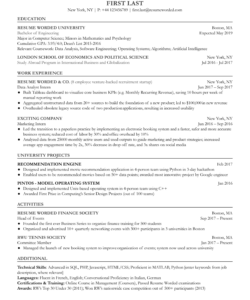Crafting a compelling resume can feel like an overwhelming task, especially when you’re aiming for a leadership role like a food service manager. You know you have the skills, the experience, and the passion to run a successful operation, but how do you translate that into a document that truly captures an employer’s attention? In a competitive job market, your resume is often your first and only chance to make a lasting impression, proving you are the ideal candidate before you even step into an interview.
This article aims to be your comprehensive guide, helping you navigate the process of building an outstanding resume. We’ll explore the essential components, highlight what hiring managers truly look for, and provide actionable advice to ensure your application stands out from the crowd. Whether you’re starting from scratch or refining an existing draft, understanding these elements is crucial for creating an effective resume, perhaps even leveraging a food service manager resume template as a starting point.
Crafting a Standout Food Service Manager Resume
Your resume isn’t just a chronological list of past jobs; it’s a strategic marketing document designed to showcase your unique value proposition as a food service leader. For a food service manager, this means demonstrating a blend of operational excellence, team leadership, customer service prowess, and financial acumen. It’s about painting a vivid picture of the positive impact you’ve had in previous roles and the potential you bring to a new organization.

Start with a powerful professional summary or objective statement at the top. This isn’t just a formality; it’s your elevator pitch, a concise paragraph that immediately communicates your most relevant skills, years of experience, and career aspirations. Tailor this section specifically to each job you apply for, using keywords from the job description to signal to Applicant Tracking Systems (ATS) and hiring managers that you’re a perfect fit. Think about the core strengths you want to emphasize – perhaps your ability to boost efficiency, improve customer satisfaction, or manage large teams.
The experience section is where your resume truly shines. Don’t just list your duties; transform them into achievements. Instead of saying "Managed staff," write "Led a team of 25 staff members, improving service speed by 15% and reducing customer wait times." Quantify your accomplishments whenever possible using numbers, percentages, and specific outcomes. Employers want to see the tangible results of your work.
Showcasing Your Leadership and Operational Prowess
When detailing your experience, focus on situations where you demonstrated strong leadership, problem-solving skills, and operational expertise. This includes everything from inventory management and cost control to staff training and conflict resolution. Provide concrete examples that illustrate your capabilities in a practical setting.
Consider including details such as:
Beyond your professional experience, dedicate a clear section to your skills. This should include both hard skills (like POS systems, food safety certifications, inventory software, budgeting tools, menu development) and soft skills (such as communication, problem-solving, adaptability, team building, and conflict resolution). A well-structured skills section quickly allows recruiters to see if you possess the specific technical and interpersonal abilities required for the role.
Beyond the Basics: Tips for Optimizing Your Food Service Resume
While a strong content foundation is essential, how you present that content is equally important. Think of your resume as a professional advertisement for yourself. A clean, organized, and easy-to-read layout is crucial. Use consistent formatting for headings, bullet points, and dates. Avoid overly elaborate designs or distracting graphics unless you’re applying for a very specific creative role where it’s explicitly encouraged. The goal is clarity and professionalism.
Remember the power of tailoring. Even if you begin with a solid food service manager resume template, always customize it for each application. Read the job description carefully and incorporate relevant keywords and phrases naturally into your summary, experience, and skills sections. This not only shows employers you’ve done your homework but also helps your resume get past those initial ATS filters, ensuring a human eye reviews your application.
Proofreading cannot be stressed enough. A single typo or grammatical error can undermine your professionalism and attention to detail, qualities that are paramount for a food service manager. After you’ve written your resume, take a break and then review it with fresh eyes. Better yet, ask a trusted friend or colleague to proofread it for you. A second pair of eyes often catches mistakes you might overlook.
Furthermore, ensure your contact information is accurate and prominent. This includes your phone number, professional email address, and possibly a link to your LinkedIn profile if it’s up-to-date and showcases additional professional achievements or recommendations.
Here are a few more critical tips for an optimized resume:
Your resume is more than just a document; it’s a reflection of your professional journey and your future aspirations. By thoughtfully constructing each section, focusing on quantifiable achievements, and meticulously refining your presentation, you create a powerful tool that speaks volumes about your capabilities. It’s your opportunity to tell a compelling story about your leadership, operational skills, and dedication to excellence in the bustling world of food service.
With a well-structured and compelling resume, you’re not just applying for a job; you’re making a strong case for why you are the indispensable asset every thriving food service operation needs. Take the time to perfect it, and you’ll undoubtedly open doors to exciting new opportunities in your career.


